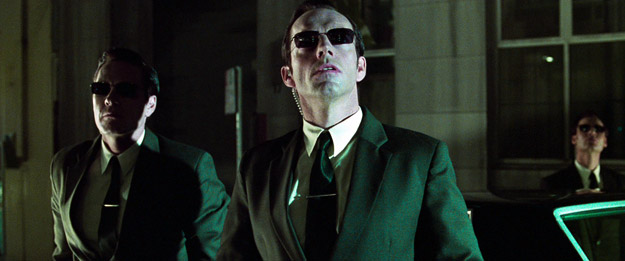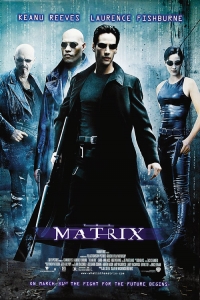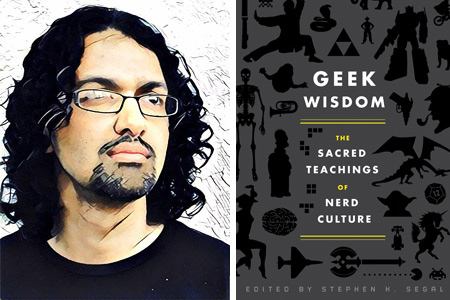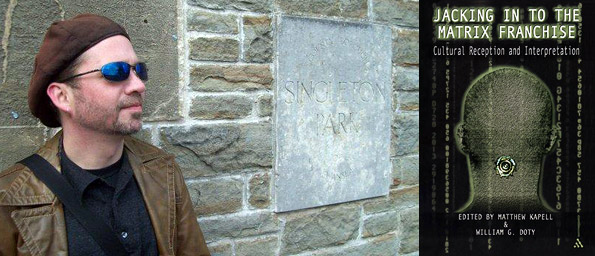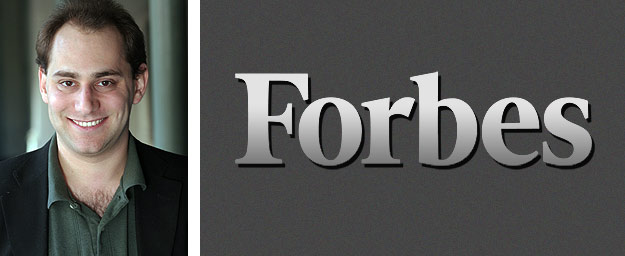“The Matrix managed to outdo Star Wars in terms of truly reshaping the zeitgeist mere months before George Lucas’ first prequel was supposed to roar into theaters and show everyone how big budget sci-fi is supposed to work.” — Zaki Hasan, co-author of Geek Wisdom: The Sacred Teachings of Nerd Culture
The Digital Bits and History, Legacy & Showmanship are pleased to present this retrospective commemorating the 20th anniversary of the release of The Matrix, the popular, franchise-inspiring action/sci-fi/cyberpunk adventure starring Keanu Reeves (Bill & Ted’s Excellent Adventure, John Wick) and highlighted by Academy Award-winning editing, sound effects editing, sound, and visual effects.
Directed by The Wachowskis (Bound, Speed Racer), produced by Joel Silver (Die Hard, Lethal Weapon) and co-starring Laurence Fishburne (Boyz n the Hood, What’s Love Got to Do with It), Carrie-Anne Moss (Memento, Disturbia), Hugo Weaving (V for Vendetta, The Lord of the Rings), and Joe Pantoliano (Midnight Run, The Fugitive), The Matrix introduced moviegoers to Bullet Time and featured the music of Deftones, Marilyn Manson, Prodigy, Rage Against the Machine, Rammstein, and Rob Zombie. [Read on here...]
The Matrix opened twenty years ago this spring, and for the occasion The Bits features a Q&A with a trio of pop culture authorities who reflect on the film two decades after its debut.
The participants are (in alphabetical order)….
Zaki Hasan is a Professor of Communication and Media Studies and the co-author of Geek Wisdom: The Sacred Teachings of Nerd Culture (edited by Stephen H. Segal, Quirk Books, 2011).
Matthew Kapell is a Lecturer in American Studies and the co-editor of Jacking In to the Matrix Franchise: Cultural Reception and Interpretation (Bloomsbury, 2004).
Scott Mendelson is a box office analyst and film critic for Forbes magazine.
The interviews were conducted separately and have been edited into a “roundtable” conversation format.

Michael Coate (The Digital Bits): How do you think The Matrix should be remembered on its 20th anniversary?
Zaki Hasan: It came out of nowhere and fundamentally changed moviemaking in its wake. It made Keanu Reeves a legitimate action star in a way he’d never been before — something that’s still paying dividends for the actor (and us) to this day via the John Wick franchise. It correctly foreshadowed our obsession with fictional “online” lives at the expense of actual flesh-and-blood interactions. It managed to outdo Star Wars in terms of truly reshaping the zeitgeist mere months before George Lucas’ first prequel was supposed to roar into theaters and show everyone how big budget sci-fi is supposed to work.
Matthew Kapell: I think we should remember it the way we’d remember any important film in film history — be it Casablanca, or Star Wars — it’s a film that so captures its time that it can help remind us of that time.
Scott Mendelson: Well, it is a classic example of the value of “rip off, don’t remake.” The film is littered with references, concepts, plot beats and ideas from other books, movies, TV shows and comic stories. But this hybrid was mixed into what is itself an original and unique-unto-it-self stew. It is a touchstone of a time when audiences wanted new and original cinematic fantasies, where the notion of being dropped into a fantasy world, with only recognizable movie stars as a lifeline, was considered a desired cinematic experience. Nowadays, audiences don’t care about movie stars and will look at the promise of never-before-seen/heard sights and sounds as a reason not to see the movie. In 1999, The Matrix was a big deal because it was new. But in 2019, audiences would be far more likely to flock to a reboot to The Matrix than the proverbial “new Matrix.”
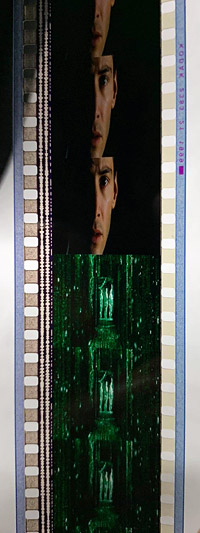 Coate: What do you remember about the first time you saw The Matrix?
Coate: What do you remember about the first time you saw The Matrix?
Hasan: What it felt like being in the audience for the opening night for The Matrix is something I carry with me to this very day. It was the General Cinemas at Yorktown Mall (now an AMC) in Glen Ellyn, Illinois, and the only thing I knew was that the marketing had promised something that couldn’t be described, only experienced. And boy, was that hype ever right. As I let the movie wash over me, I knew it was something unlike anything I’d ever seen before, even as it pulled from a variety of influences both overt and subtle. Walking out of the theater, I felt lightheaded and euphoric, like I’d just gotten to be part of the very special, select group of folks who’d seen this thing just before an avalanche of hype was sure to envelope it in the weeks and months ahead. I had every certainty it would become a phenomenon, and of course that’s exactly what happened.
Kapell: I had a new baby and had seen few films for about 18 months, and my wife and I were also pretty broke postgraduate students. I had no intention of seeing it as it looked like it would be another Keanu movie akin to Johnny Mnemonic or Chain Reaction. Then I read a review of it on Aint-it-cool-news that said something like, “Stop what you are doing and go see this movie right now!” We borrowed my mother-in-law’s car when we dropped off our daughter and went to see it. After, so jazzed by it, I found myself driving that car at about 90 in a 45 zone and my wife had to say, “Whoa! Cool down!”
Mendelson: I was out of the country on a family vacation when the film opened, so I returned to the states and was somewhat surprised to realize that The Matrix was (a) earning generally strong reviews and (b) had earned nearly $40 million in its Wed-Sun debut weekend (which was huge for a wholly original, R-rated action flick). I saw it the Tuesday after its debut. I liked it quite a bit, and I knew the movie worked at least partially because of its adherence to the “Hero’s Journey.” More so than even Star Wars, it hits every beat of the classical heroic template, and the Wachowskis used that rock-solid foundation to base their hybrid of dystopian sci-fi, kung fu, Hong Kong run-and-gun action and anime in a way that was user-friendly to those not immersed in the genre sandboxes in which it was playing. But at the time, I was a little annoyed that Dark City didn’t get this kind of reception a year prior.
Coate: In what way is The Matrix a significant motion picture?
Hasan: While the Wachowskis popularized “bullet time” and brought Hong Kong martial arts and action sensibilities to the mainstream, they also dared to delve into potent philosophical and sociopolitical territory that remains practically anathema for a big budget effects opus. For all the special effects wizardry and eye-popping chopsocky that it’s right lauded for, you can put all of that to one side and The Matrix would still deserve to be valorized for the way it plugged the deep dive philosophy of deep thinkers like Foucault and Baudrillard into the cortical circuits of an entire generation of folks who’d likely never have even thought to seek them out otherwise.
Kapell: Well, there’s two reasons, right? There’s the technological part — the new things in filmmaking like “bullet time” that made for a film that was very different looking and feeling. But, it’s also important to remember, I think, that this is before superhero movies and, on a narrative level, it’s very much a superhero origin story. So, it transitions us culturally away from the 80s-90s film styles to what will be the stuff we see in the early aughts and beyond. It’s also significant in its philosophical positioning, I think. There’s a lot of books besides mine that look at this, and we all argue about how the film tries to do “reality” and ideas of the “Modern” and “postmodern” through its presentation of another form of the “Hero’s Journey.” So, it’s both a film of its exact time and a film that really offers insights to much of Western intellectual history.
Mendelson: It came at just the right time in terms of advancing technology (it was the first must-own title of the DVD era) and a certain “everything is going to hell after this millennium” feeling that made its fantasy deeply cathartic. And, yes, the film’s “cool clothes, big guns and impossible stunts” sheen made it an unusually compelling wish-fulfillment fantasy, along with the obvious appeal of “You’re the special” storytelling that has propelled everything from Star Wars to, well, the Bible. Now the sequels challenge that idealism, as many sequels do, and that’s just one reason why I think their reception was, especially post-release, somewhat rough. The original film was a classical “I’m not really a nobody, I’m actually the ultimate superhero who can save the day, get the girl and remake my own destiny” adventure. But the sequels confronted and dissected that fantasy while doubling-down on the philosophy and in putting people of color in major roles.
